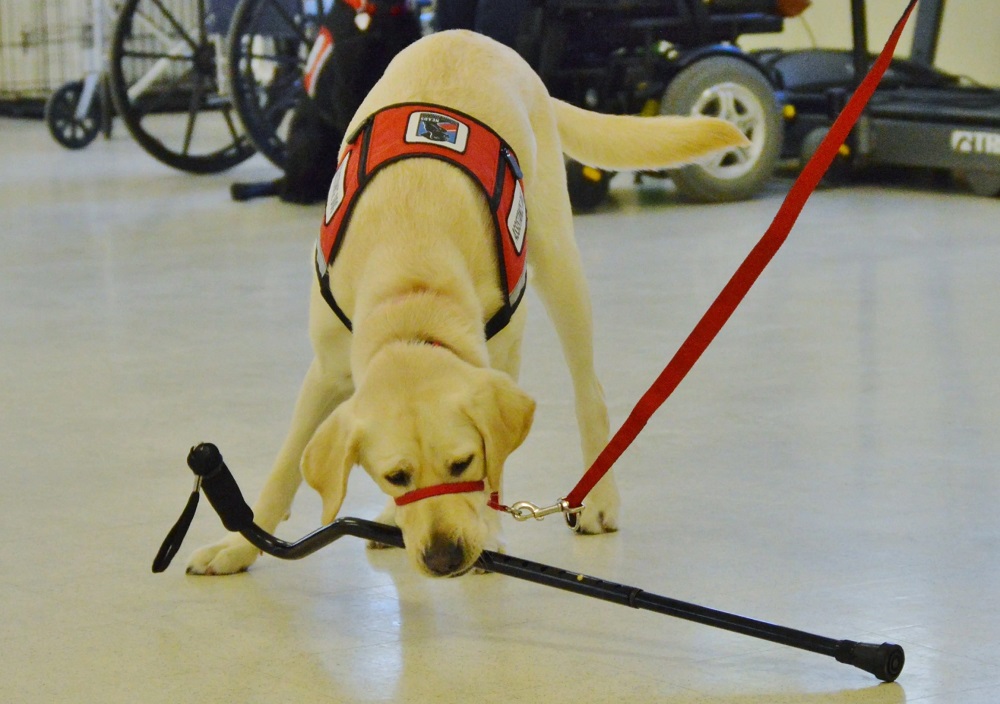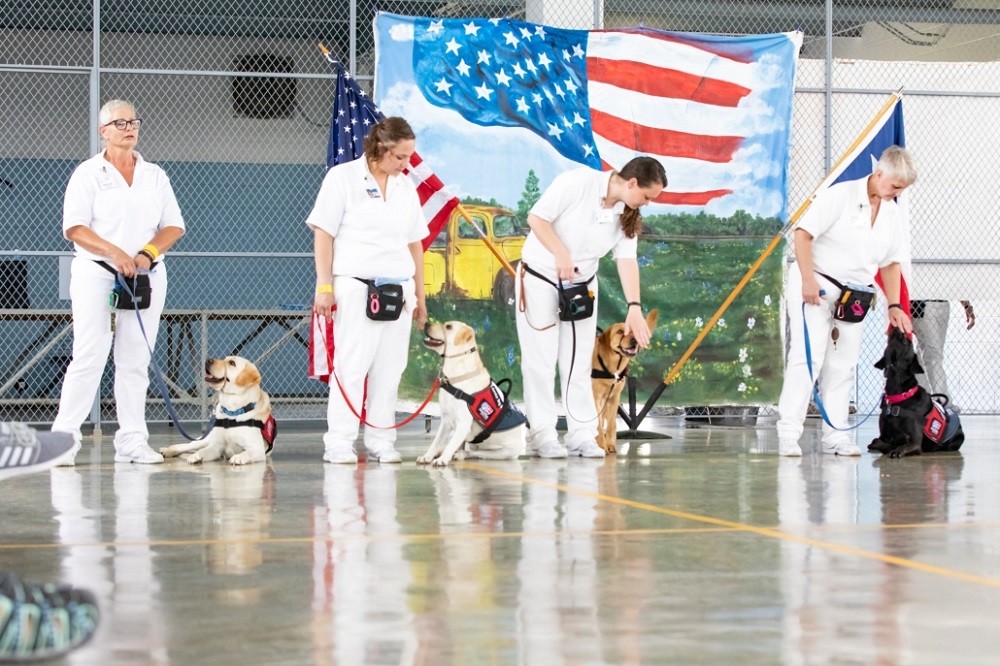Prison Puppies... UNLEASHED
Dogs are often called a man’s best friend, especially for those who depend on them for assistance with daily tasks. Professionally trained service dogs don’t just appear out of thin air; they undergo rigorous training to become vital companions for those in need, including those who have served our country. But where do these puppies learn their skills? The answer may surprise you: from inmates.
Correctional facilities nationwide offer rehabilitation programs designed to help inmates prepare for life after release. These programs can include literacy classes, parenting courses, library services, and adult continuing education. Inmates often find these opportunities invaluable, equipping them to adapt more easily to societal norms upon their return. Among the most popular of these programs is the Prison Puppy Program, which teaches inmates the responsibilities of caring for and raising young dogs.
Three organizations—America’s VetDogs, NEADS World Class Service Dogs, and Patriot Paws Service Dogs—each run their own specific Prison Puppy Programs in various locations nationwide. Whether the dogs are being raised to assist wounded veterans or individuals with disabilities, all programs adhere to similar training guidelines.
This blog will explore how correctional institutions across the country host Prison Puppy Programs, enabling inmates to train puppies that will eventually become service dogs for individuals in need.

Model Inmates Make Model Puppies
This program offers inmates a valuable opportunity to engage in meaningful work while serving their time. Due to the high interest in becoming dog caretakers, there is a rigorous selection process to identify suitable candidates. Inmates interested in becoming dog handlers must submit a letter of intent to a liaison, which social workers, case managers, psychologists, custody staff, and program coordinators review. Additionally, they must have acceptable behavioral records and pass an intelligence screening.
The prison liaison selects inmates deemed appropriate for the role, typically those described as “model inmates” with exemplary records. In some cases, organizations may require further interviews with their internal staff to ensure the inmates are the right fit for their programs. Needless to say, it’s a competitive program to be accepted into, but worth the process(America’s VetDogs; World Class Service Dogs).
Being in a prison setting allows the dogs to be around many different personalities. You see a nurturing side of the inmates that isn’t always evident to the public.
Kathy ForemanDirector of NEADS Training
Puppies Get Homework, Too?
The puppies begin their training at a very early age. Once they reach around eight to nine weeks old, they are transported in groups of three to four to join their specific Prison PUP Program. Upon arrival, they start learning basic skills, such as housebreaking and crate training. Although the puppies “live” in their primary handler’s cell, most of their time there is spent sleeping. The majority of their days are spent outside the cell, attending classes, participating in programs, and observing recreational activities alongside their handlers.
Certified program instructors visit the prison at least once a week to conduct classes and guide the puppies' training. Handlers learn essential obedience skills for their service dogs, including retrieving dropped items, opening doors, pushing handicapped door buttons, and providing balance and support on stairs. They also acquire grooming techniques and basic first-aid skills to monitor the puppies’ health.
Staff trainers assess each puppy to make training recommendations and assign homework to the handlers. Inmates are evaluated quarterly using an assessment form to determine their ability to train the dogs in the fifty-five behaviors required for certification. Inmates who advance in their training often take on mentoring roles for newcomers entering the program (America’s VetDogs; Patriot Paws Service Dogs; World Class Service Dogs).
It’s a great program on many different levels. It helps you get up every morning with a purpose. Every day you have responsibilities that you can’t just brush off, you need to step up, which has helped me develop into a responsible and conscientious person. Being a part of this program allows me to give back to the community and it has given me a sense of self-worth that I haven’t felt before.
Inmate Dog Handler

Getting Ready for the Real World
Inmates facilitate the socialization of the puppies by bringing them along whenever possible. Whether attending a medical appointment, visiting the TV lounge, or spending time in the family and friends' room, the handler typically keeps the puppy by their side. Frequently visiting new locations helps the puppies become acclimated to different environments. Some program instructors are even granted permission to bring everyday items—such as hats, umbrellas, skateboards, and battery-operated toys—into the prison to help socialize the puppies to things they will encounter outside the facility.
On weekends, the puppies go home with volunteers who expose them to car rides, traffic noise, store visits, restaurants, and hospitals, helping them build confidence for future outings with their veteran partners. Once the program instructors determine that the puppies have matured appropriately, they assess the dogs for final training and client matching. Statistics show that prison-raised dogs typically acquire the necessary skills to complete the final training process in half the time it takes for home-raised dogs. Because inmates can dedicate significant time and energy to training, they provide consistent and elevated instruction, enabling the program to place dogs with people in need more quickly (America’s VetDogs; World Class Service Dogs).
The Impact Prison Puppy Programs
The impact of the Prison PUP Programs on inmates is significant. Even officers and inmates who do not participate in the program report that the presence of the puppies positively changes the atmosphere for everyone. These programs not only train service dogs for disabled veterans but also provide inmates with a meaningful way to give back to the community during their incarceration. The skills inmates acquire through this program aid their reintegration into society and help reduce recidivism rates (Patriot Paws Service Dogs; World Class Service Dogs).
Unfortunately, jails and prisons often carry a negative reputation for lacking sufficient opportunities for personal growth and rehabilitation. However, facilities that offer programs like the Prison Puppy Program help inmates prepare for life outside. In doing so, they enable inmates to contribute to their community while providing the invaluable gift of a service dog to those in need.
The NEADS program has benefited the institution tremendously. The inmates involved in the program get a really positive impact from the training and life skills they receive. When the inmates have the opportunity to meet the client who is adopting the puppy, the inmate sees the impact their hard work has had and is proud of providing a positive benefit to someone else. It’s a huge amount of reparation that they feel they can contribute.
Colette GoguenSuperintendent, DOC
Programs like the Prison Puppy Program foster personal growth, helping individuals develop into responsible and conscientious members of society. And the positive impact of the Prison Puppy Program extends beyond the prison walls. Inmates involved in this initiative experience a sense of accomplishment and pride as they witness the difference their hard work makes in the lives of others. This exchange of care and companionship highlights the potential for rehabilitation and change within correctional facilities.

References:
America’s VetDogs
Retrieved from:
https://www.vetdogs.org/av/dogprograms/prisonpuppyprogram.aspx#:~:text=In%20this%20special%20program%2C%20inmates,dog's%20future%20handler%20and%20partner.
World Class Service Dogs
Retrieved from:
https://neads.org/training-placement/prison-pup-program/
Patriot Paws Service Dogs
Retrieved from:
https://patriotpaws.org/programs/prison-programs/
YouTube | NEADS Prison PUP Program 20 Year Anniversary (2018).
https://www.youtube.com/watch?v=FQ2ix7NAU5A&t=2s
Imagery:
Four Dogs Graduate from Prison Puppy Program at Osborn Correctional Facility
https://www.youtube.com/watch?v=cznuiUyHBgI&t=1s
World Class Service Dogs
Retrieved from:
https://neads.org/training-placement/prison-pup-program/
Patriot Paws Service Dogs
Retrieved from:
https://patriotpaws.org/programs/prison-programs/

